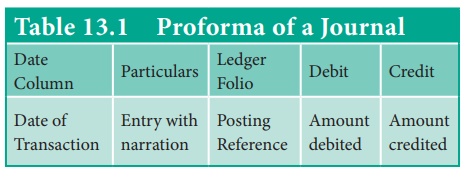Finishing Entrepreneurship - Accounting and Book Keeping | 12th Textiles and Dress Designing : Chapter 13 : Finishing Entrepreneurship
Chapter: 12th Textiles and Dress Designing : Chapter 13 : Finishing Entrepreneurship
Accounting and Book Keeping
Accounting and Book Keeping
Every enterprise irrespective of whether it is large or small,
public or private, sole or partnership has financial concern and wish to make
profits. It is humanly impossible to remember all the transactions. So there is
a need to record them. Accounting is said to be the language of business as it
communicates or reports the results of business operations. Accounting is
described as the art of recording, classifying and summarising in a significant
manner and in terms of money, transactions and events which are in part of
financial character and interpreting the results thereof.
The scope of accounting comprises of the following heads :
Data Creation and Collection
Every transaction related to some financial activity is noted and
recorded into books. This may be done in manual, mechanical or electronic way.
Years back it was done manual and books or physical files were maintained. But
in the recent years computers are used and electronic files are maintained.
Important files are locked with suitable password.
Data Evaluation
Data Evaluation controls the activities of business, evaluating
the performance of the business and analysing the accounting information for
decision making purposes. This activity helps the company to start new product
production or modify the existing product.
Data Reporting
Data Reporting consists of two parts namely external and
internal reporting. External reporting is the communication of financial
information to the outside portion. Eg. : Shareholders and government agencies.
Internal reporting is concerned with the communication of results of financial
analysis to the management for decision making purposes.
Accounting
Accounting is carried out in four steps or stages namely recording the
transactions, classifying the transactions, summarizing the transactions and
interpreting the transactions.
Recording the Transactions
All business transactions are first recorded in the book of
original entry with the help of cash memos, cash receipts and invoices. This
book is known as “The Journal”. All the business transactions are entered in a
chronological order. Books of primary entry are Journal and subsidiary books
and books of final entry is the “ledger”.

Classifying the Transactions
Transactions of similar native are grouped together and posted
into another book called “The Ledger”. The purpose of classifying the
transactions of similar nature is to understand their combined effect. For this
purpose all such ledger accounts are balanced for a particular period of time.
Summarising the Transactions
Summarising the Transaction is the preparation of the year end
summary known as “Final Accounts”. Before preparing final accounts, a list of
all ledger balances are prepared in the form of a statement known as “Trial
Balance”. Final accounts consist of trading and profit and loss, Account and
Balance Sheet”. Trading, profit and loss account reveals the net result of the
business. The balance sheet depicts the financial position of the business.

Interpreting the Results
The final stage is to analyse and interpret the results as per the
final accounts. This includes computation of various accounting ratios to
assess the liquidity, solvency and profitability of the business. This helps
the entrepreneur understand all the activities of the company, financial status
and plan for the future of the company.
The accounting system has two stages namely book-keeping and
accounting. Book Keeping is a process of maintaining routine
records in prescribed form and according to set rules, of all events which
affect the financial state of the organisation. Accounting is the
summarisation from time to time of the information contained in the
records, its presentation in a significant form to interested parties, and its
interpretation as an aid to decision making by these parties.
Trial Balance
It is a statement containing the balances of all ledger accounts
as on given date. It is prepared to check the arithmetical accuracy of the
ledger postings.
Financial Statements
The purpose of financial accounting is to keep records of all the
financial transactions so that profit earned or loss incurred can be worked
out. Financial position of the business can be ascertained and the financial
information required can be provided. The financial statements primarily
include trading and profit and loss account balance sheet and Generally
Accepted Accounting Principles (GAAP) state that a complete set of financial
statements must include:
·
Profit and Loss Account or Income Statement,
·
Statement of Retained Earnings,
·
Balance Sheet, and
·
Statement of changes in Financial Position.
Fund Flow Statement
It is an important analytical tool in hands of the management
useful for analysing the past and planning for the future. It is useful in
following and many more aspects;
·
It serves as a control device
·
It helps in proper allocation of resources
·
It helps in the management to formulate financial policies
·
It communicates valuable information regarding concerns financial
position to outside world It enables the investors and creditors in assessing
the degree of risk involved in granting credit or associating with the
business.
Related Topics